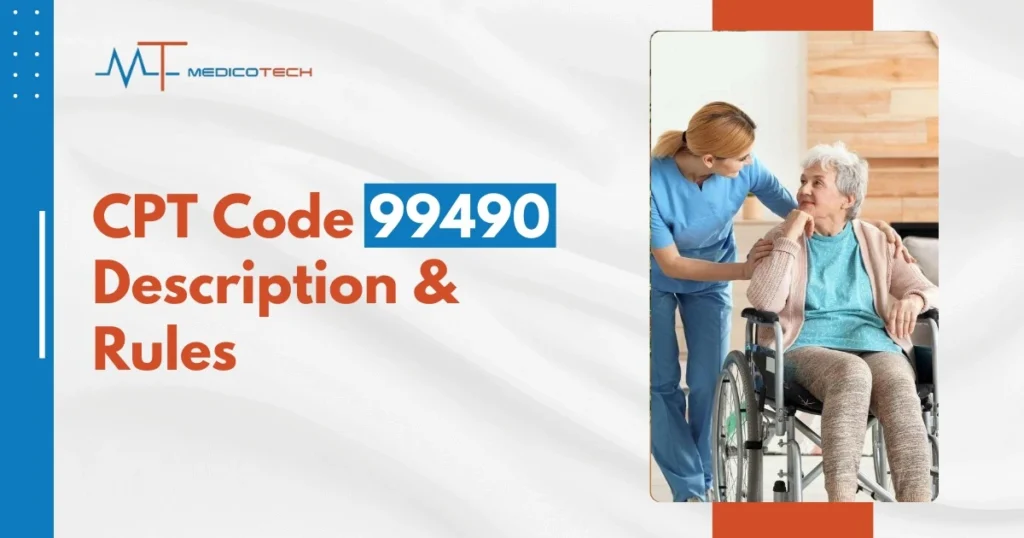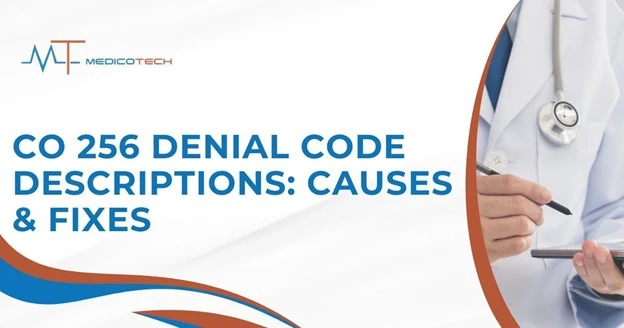What Is CPT Code 99490?
CPT code 99490 is the most widely used billing code for Chronic Care Management (CCM) under Medicare. It covers at least 20 minutes of non-face-to-face care coordination provided by clinical staff under the direction of a physician or other qualified health care professional. The goal of this service is to help patients with two or more chronic conditions manage their health better, prevent unnecessary hospitalizations, and reduce overall healthcare costs.
Why Medicare Introduced CPT 99490
Medicare launched CPT 99490 in 2015 as part of its shift toward value-based care. Chronic conditions account for a significant portion of healthcare spending in the U.S., and Medicare beneficiaries are among the most affected. By reimbursing providers for time spent coordinating care outside traditional office visits, CMS aimed to:
- Improve patient outcomes through continuous management
- Reduce emergency room and hospital visits
- Encourage preventive care and proactive monitoring
- Support physicians in providing comprehensive patient care
This change recognized the often-unseen work physicians and clinical teams do every month to keep patients stable.
Who Qualifies for 99490 Services?
Not every Medicare beneficiary is eligible for 99490. Patients must have two or more chronic conditions that are expected to last at least 12 months or until death. These conditions must also place the patient at significant risk of death, acute worsening, or functional decline.
Importantly, patients must provide informed consent, either verbally or in writing, before being enrolled. Only one practitioner per month may bill Medicare for CCM services for a given patient, ensuring accountability and continuity of care.
CPT 99490 Definition and Time Requirement
At its core, CPT 99490 represents 20 minutes of clinical staff time per calendar month spent on non-face-to-face services. This time may include updating care plans, communicating with caregivers, reviewing test results, coordinating with specialists, or refilling prescriptions.
In line with Medicare’s 8 minute rule, providers can only bill for services once the 20-minute threshold has been met. If additional time is required, other CCM add-on codes such as 99439 may be used
Chronic Conditions Covered Under CPT 99490
Medicare does not provide an exhaustive list of eligible conditions, but it does highlight several common examples. Patients with the following are typically covered under CCM programs:
- Diabetes
- Hypertension
- Chronic Obstructive Pulmonary Disease (COPD)
- Congestive Heart Failure (CHF)
- Depression or other behavioral health conditions
- Cancer
- Osteoporosis
- Arthritis
The key requirement is that the conditions are chronic, long-lasting, and pose significant health risks.
Patient Eligibility Criteria
To bill CPT 99490, providers must ensure patients meet these requirements:
- Two or more chronic conditions documented in the health record.
- Conditions expected to last 12 months or more.
- A personalized, electronic care plan created and shared with the patient.
24/7 access to a member of the care team for urgent needs. - Patient consent to participate in CCM services.
These criteria ensure that only patients who will truly benefit from continuous management are enrolled.
Who Can Bill CPT Code 99490?
CPT 99490 can be billed by both physicians and certain non-physician practitioners, provided they are legally authorized within their state. Eligible providers include:
- Physicians (MDs, DOs)
- Nurse Practitioners (NPs)
- Physician Assistants (PAs)
- Certified Nurse Midwives (CNMs)
- Clinical Nurse Specialists (CNSs)
Clinical staff such as nurses or medical assistants may perform much of the work under general supervision, but the billing must always occur under the supervising provider’s NPI.
CPT 99490 Billing Requirements and Guidelines
Successful Medical billing for 99490 requires compliance with several CMS rules. Providers must document at least 20 minutes of CCM services per month, ensure that services are non-face-to-face, and maintain a comprehensive care plan in the EHR.
Additionally, patients must have continuous access to care management services, including after-hours availability. If CCM is billed on the same day as another service (such as an office visit), providers may need to use modifier -25 to differentiate the services.
Required Documentation for CPT 99490
Accurate documentation is the backbone of CCM billing. Providers should clearly record:
- The patient’s chronic conditions and health risks
- Patient consent to participate
- The total time spent or start/stop times
- Details of care coordination activities (e.g., medication refills, referrals, test follow-ups)
- The comprehensive care plan with measurable goals and interventions
This documentation not only supports billing but also protects providers during audits.
Date of Service and Supervision Rules
The date of service (DOS) for CPT 99490 should be the day when the 20 minutes of billable time is reached. Services may be performed throughout the month but billed once the time requirement is met.
In terms of supervision, CPT 99490 falls under general supervision rules. This means the billing provider does not need to be physically present while clinical staff perform services, as long as they remain responsible for oversight.
Patient Consent Requirements
Before enrolling patients in CCM, providers must obtain consent. This can be verbal or written, but it must be documented in the patient’s record. Patients should be informed about:
- What CCM services include
- Any potential out-of-pocket costs (copays or deductibles)
- The fact that only one provider can bill for CCM each month
- Their right to withdraw from the program at any time
Clear consent ensures transparency and builds patient trust.
Care Plan Requirements
A comprehensive, patient-centered care plan is mandatory for CPT 99490. This plan should include:
- Problem list and expected outcomes
- Measurable treatment goals
- Symptom management strategies
- Medication lists and adherence support
- Roles of care team members
- Referrals to community or social services
- A schedule for ongoing review and updates
The care plan must be recorded in the EHR and a copy provided to the patient and caregivers.
CPT 99490 vs. 99439 (Additional 20 Minutes)
While CPT 99490 covers the first 20 minutes, CPT 99439 is used for each additional 20 minutes of clinical staff time in the same month. For example, if a patient requires 40 minutes of CCM services, the provider would bill 99490 + 99439. If 60 minutes are provided, the claim would include 99490 + 99439 x2.
CPT 99490 vs. 99487 & 99489 (Complex CCM)
Complex CCM codes are designed for patients with more intensive needs. CPT 99487 covers the first 60 minutes of complex CCM involving moderate- to high-complexity decision-making, while CPT 99489 is an add-on for each additional 30 minutes. In contrast, CPT 99490 applies to non-complex CCM, where medical decision-making is less intensive and only 20 minutes of staff time is required.
CPT 99490 vs. 99491 (Physician-Provided CCM)
The key distinction between 99490 and 99491 lies in who provides the service. CPT 99490 counts clinical staff time under supervision, whereas CPT 99491 requires the physician or qualified provider personally to spend at least 30 minutes delivering CCM services. This makes 99491 more provider-intensive and often reimbursed at a higher rate.
Non-Billable Codes in the Same Month
Providers must be careful not to bill CPT 99490 in the same month as certain other codes. These include:
- 99495–99496 for Transitional Care Management
- G0181–G0182 for Home Health or Hospice Supervision
- 90951–90970 for End-Stage Renal Disease services
Because CCM services are designed to cover a broad spectrum of non-face-to-face management, CMS limits overlapping codes to prevent double billing.
CPT 99490 Reimbursement Rates (2024–2025)
Reimbursement for CPT 99490 is determined annually by the Medicare Physician Fee Schedule (MPFS). In 2025, the national average non-facility reimbursement rate is approximately $60 per patient, per month for the first 20 minutes of clinical staff time. Rates may vary slightly based on geographic practice cost indices (GPCI), which adjust payments depending on regional costs of care.
Providers can check the latest rates using the CMS MPFS look-up tool. Rural Health Clinics (RHCs) and Federally Qualified Health Centers (FQHCs) may see slightly different reimbursement rules, often through HCPCS codes.
How Much Medicare Pays for CPT 99490
Medicare typically covers 80% of the approved amount for CPT 99490, while the patient is responsible for the remaining 20% coinsurance unless they have supplemental coverage. For example, if the reimbursement rate is $60, Medicare pays $48, and the patient pays about $12.
This structure ensures both patients and providers remain engaged in the program. Patients benefit from ongoing management, while providers are compensated for non-face-to-face time that often goes unpaid in traditional models.
Revenue Potential for Practices
CPT 99490 can generate significant recurring revenue for practices. For instance, enrolling 100 Medicare patients could bring in:
- $60 × 100 patients = $6,000 per month
- $72,000 per year (before add-on codes or additional CCM services)
When combined with add-on codes such as 99439 for extra time, or when paired with Remote Patient Monitoring (RPM), the financial impact can be much greater. Beyond revenue, CCM programs also improve quality scores, patient engagement, and outcomes, helping practices transition toward value-based care models.
Common Billing Mistakes to Avoid
Despite the potential, billing errors can lead to denials or audits. The most frequent mistakes include:
- Failing to document the full 20 minutes of clinical staff time.
- Billing CPT 99490 in the same month as restricted codes (e.g., TCM or ESRD services).
- Not maintaining a comprehensive care plan in the EHR.
- Missing or undocumented patient consent.
- Billing for time that overlaps with office visits or hospital stays.
Avoiding these mistakes not only secures reimbursement but also protects providers from compliance risks.
Medicare Rules for Billing Compliance
CMS enforces strict compliance rules for CCM. Providers must:
- Use the correct CPT/HCPCS codes for non-complex vs. complex CCM.
- Ensure general supervision requirements are met for clinical staff.
- Submit claims with accurate date of service when the 20-minute threshold is achieved.
- Confirm that only one provider bills CCM per patient, per month.
Noncompliance may trigger claim denials, repayment demands, or audits, making accurate documentation and billing essential.
Best Practices for CPT 99490 Billing
To maximize success with 99490, providers should:
- Identify eligible patients using EHR reporting tools.
- Educate patients about CCM benefits to increase enrollment and retention.
- Assign dedicated staff to manage monthly follow-ups.
- Use CCM software platforms to track time, document activities, and streamline billing.
- Regularly review care plans and update them to reflect patient progress.
These practices ensure compliance, improve efficiency, and build patient trust.
24/7 Patient Access Requirement
One of the most important CMS requirements is that patients must have 24/7 access to a care team member who has immediate access to their medical record. This goes beyond a simple answering machine. Patients must be able to reach a qualified team member at any time to address urgent needs.
This requirement ensures continuity of care and supports the program’s primary goal—preventing complications that could otherwise lead to emergency visits or hospitalizations.
Audit-Ready Documentation Tips
Because CCM is heavily regulated, providers must always be ready for a compliance audit. Key tips include:
- Document total or start/stop time for each interaction.
- Keep a comprehensive care plan updated in the EHR.
- Record patient consent clearly in the medical record.
- Store notes on all non-face-to-face activities, including phone calls, medication refills, and care coordination tasks.
- Track who performed the service (clinical staff vs. physician).
Proper documentation not only secures reimbursement but also demonstrates quality of care.
Integrating CPT 99490 With Remote Patient Monitoring (RPM)
Many practices combine CCM with Remote Patient Monitoring (RPM) for enhanced care. While CCM covers time spent coordinating and managing chronic conditions, RPM codes (such as 99454 for device supply and data transmission) reimburse for monitoring vital signs like blood pressure or glucose levels.
Together, CCM and RPM create a more comprehensive program. Providers can bill for both as long as service and time requirements are documented separately. This combination often leads to better patient outcomes and higher practice revenue.
CPT 99490 in Rural Health Clinics and FQHCs
Historically, RHCs and FQHCs billed CCM services using HCPCS code G0511. However, under the 2025 CMS Final Rule, these facilities are now permitted to bill individual CPT codes like 99490, 99439, and 99491.
This change improves transparency and ensures rural and community clinics are fairly reimbursed for the additional resources required to manage chronically ill populations. Providers should review CMS transition guidelines, as the change includes a phase-in period.
Pairing CPT 99490 With Behavioral Health Integration (BHI)
CCM can also be paired with Behavioral Health Integration (BHI) codes to address mental health needs. For example, a patient with diabetes and depression may benefit from a coordinated program that manages both physical and behavioral conditions.
While CCM and BHI may be billed concurrently, providers must ensure that time and activities for each are clearly documented and non-overlapping. This integrated approach improves patient care and creates additional reimbursement opportunities.
Frequently Asked Questions (FAQs)
How many times can CPT 99490 be billed per month?
Only once per calendar month per patient, regardless of how much time is provided beyond the first 20 minutes (unless add-on codes like 99439 are used).
Can CPT 99490 be billed with TCM (99495/99496)?
No. CPT 99490 cannot be billed in the same month as Transitional Care Management codes 99495 or 99496.
What chronic conditions qualify for CPT 99490?
Examples include diabetes, hypertension, COPD, CHF, depression, cancer, arthritis, and osteoporosis. Any chronic condition expected to last at least 12 months and posing significant risk qualifies.
Does CPT 99490 require face-to-face visits?
No. CPT 99490 covers non-face-to-face services, such as phone calls, care plan updates, and coordination with specialists. However, new patients may require an initiating face-to-face visit.
Who collects the patient copay for 99490?
The billing provider is responsible for collecting the 20% Medicare coinsurance, though many patients have supplemental insurance that may cover this cost.




